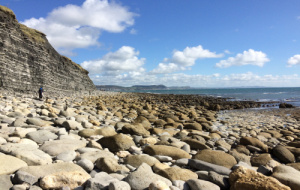Revealing hidden volcanic triggers
 Professor Tamsin Mather, Supernumerary Fellow in Earth Sciences, was recently awarded an ERC consolidator grant of €2 million for research into “Revealing hidden volcanic triggers for global environmental change events in Earth’s geological past using mercury (Hg)”.
Professor Tamsin Mather, Supernumerary Fellow in Earth Sciences, was recently awarded an ERC consolidator grant of €2 million for research into “Revealing hidden volcanic triggers for global environmental change events in Earth’s geological past using mercury (Hg)”.
Rapid global change events, like mass extinctions, have driven life’s evolution, shaping the world we live in today. However, the exact processes that cause and control them are still mostly a mystery. Episodes of large-scale volcanism, namely large igneous provinces (LIPs), are a prime contender. Recent studies have revealed the huge promise of mercury (Hg) as a marker of large-scale volcanism. V-ECHO will test the overarching theory that widespread mercury “spikes” in the geological record are definitive evidence of LIP volcanism even in the absence of coeval lavas.
V-ECHO aims to understand the importance of LIP perturbations to the global Hg cycle and how these translate into sedimentary records. It will address key questions on Hg sources and sinks. It will combine new measurements with novel experimental techniques and explore key differences in the global Hg cycle deep in Earth’s past. V-ECHO will test whether we can “sniff out” the sedimentary echoes of lost LIPs, especially in the Palaeozoic and Neoproterozoic where the LIP record becomes ever sparser. It will also explore proposed volcanic triggers for major Earth change events (e.g. oceanic anoxic events, “snowball Earths”).
The President of the European Research Council, Professor Jean-Pierre Bourguignon, commented: “This ERC funding will allow ambitious scientists to establish or strengthen their teams in Europe and be truly creative in their research. Beyond a push to the grantees’ careers, this European support will offer an excellent working environment for younger researchers at doctoral and post-doctoral levels. We look forward to see many of these daring ideas come to fruition, to the benefit of Europe at large.”
Published: 29 January 2019
Explore Univ on social media
